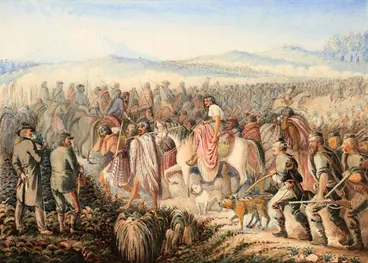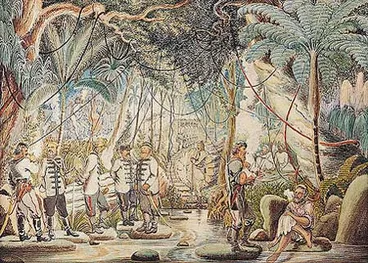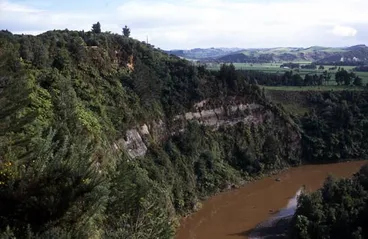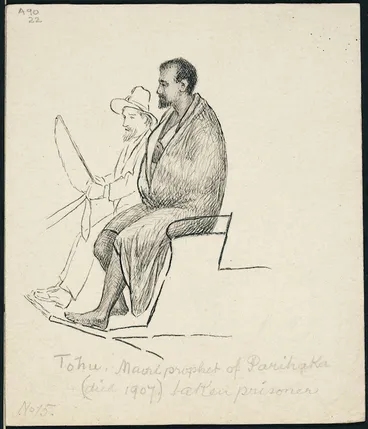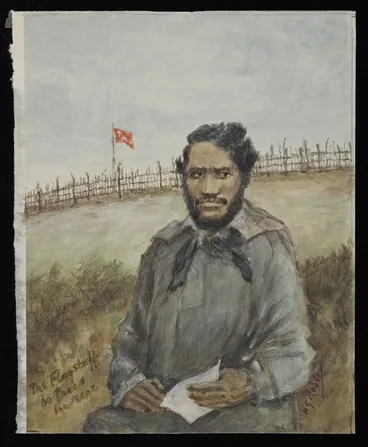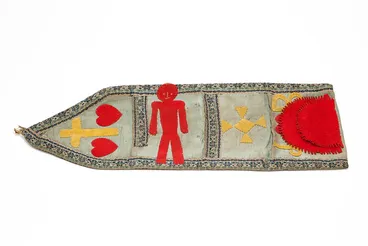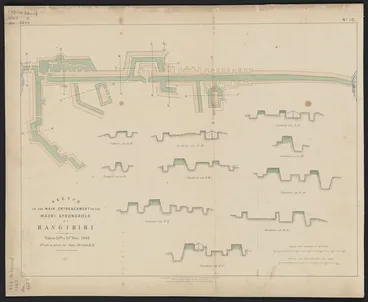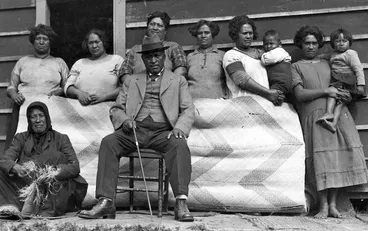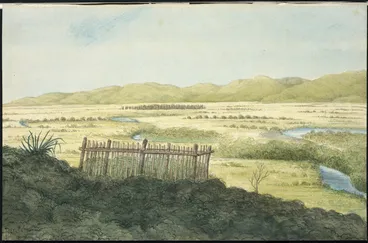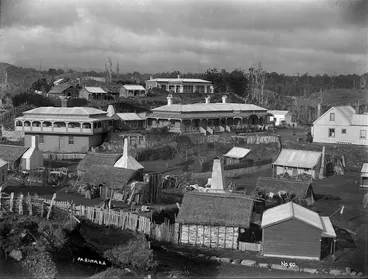War in Taranaki 1860-61 and 1864-66
A DigitalNZ Story by National Library of New Zealand Topics
The New Zealand Wars | Ngā Pakanga o Aotearoa campaigns in the Taranaki region were initiated by settlers and the New Zealand government. The spark was a dispute over land held at Waitara by Māori, but conflict soon spread throughout the Taranaki region. SCIS no: 1966002
social_sciences, arts, english, history, health, Māori, technology
Hamley, Joseph Osbertus 1820-1911 :Waitotara. [1865]
Alexander Turnbull Library
Capture of Weraroa pā
Manatū Taonga, the Ministry for Culture and Heritage
Taranaki War map 1860-61
Manatū Taonga, the Ministry for Culture and Heritage
NZ Wars: Stories of Waitara
Services to Schools
[Arden, Francis Hamar], 1841-1899 :Bell Blockhouse, Taranaki. 1860.
Alexander Turnbull Library
Māori at gates of New Plymouth cartoon
Manatū Taonga, the Ministry for Culture and Heritage
Taranaki Military Settlers, Pukearuhe
Manatū Taonga, the Ministry for Culture and Heritage
"Camp Waitara"
Puke Ariki
Memorial to the fallen in the New Zealand Wars, in Main Road, Manaia - Photograph taken by James Duncan
Alexander Turnbull Library
Telescope
Puke Ariki
Loyal and rebel districts, 1869
Archives New Zealand Te Rua Mahara o te Kāwanatanga
"The Limit of the Sap at Te Arei"
Puke Ariki
The New Zealand Gazette Extraordinary.
Puke Ariki
Pai Mārire flags
Manatū Taonga, the Ministry for Culture and Heritage
Proclamation for civil evacuation of New Plymouth during the New Zealand Wars
Alexander Turnbull Library
Plan of New Plymouth, Taranaki
Auckland Libraries
Photographer unknown :Portrait of Corpl. Goddard
Alexander Turnbull Library
Marines Disembarking 'Victoria'
Puke Ariki
Proclamations
Puke Ariki
Troops crossing Patea River, New Zealand.
University of Otago
Cannonball
Puke Ariki
Gledhill, Francis
Puke Ariki
[Hobson, Henry], fl 1881: Mount Taranaki and three groups of people
Alexander Turnbull Library
Warre, Henry James, 1819-1898 :Te Arei. Oct 17. [1864]
Alexander Turnbull Library
[Harris, Edwin] ca 1810-1895 :New Plymouth, New Zealand [1860]
Alexander Turnbull Library
Te Āti Awa lands
Manatū Taonga, the Ministry for Culture and Heritage
Wiremu Kīngi Te Rangitāke’s pā
Manatū Taonga, the Ministry for Culture and Heritage
Soldier with a pipe, book and drink
Life for a European soldier during the Taranaki campaigns wasn’t all fighting. In fact, for most of the time soldiers worked on fatigues, (menial non-military jobs like collecting firewood or watering horses etc.) marching, patrolling, constructing defensive positions and as we can see here, relaxing. This painting shows reading was a popular activity (as was, and still is, alcohol) and also smoking – which in those days was done using a pipe. Another activity implicit in this image is painting. Some British officers documented their soldiering lives through sketches and paintings. New Zealand examples included, Edward Williams, Cyprian Bridge, Horatio Robley and Von Tempsky.
Alexander Turnbull Library
Chapter 18: The First Taranaki War
Services to Schools
North (First) Taranaki war 1860-1861
Services to Schools
The First Taranaki War and Te Tau Ihu, Nelson
Services to Schools
Legacy of Taranaki land wars still lingers 157 years on
Services to Schools
Native Affairs - Taranaki land war continues
Services to Schools
The invasion of Taranaki and iwi losses
Services to Schools
The Taranaki question and the origin of the war
Services to Schools
Colonial mindset of New Plymouth's founding father revealed
Services to Schools
Taranaki Wars app
Services to Schools
The Second Taranaki War
Services to Schools
The New Zealand Wars: Taranaki prophets
Services to Schools
The battle of Moutoa Island
Services to Schools
Te Ua Haumēne – Pai Mārire and Hauhau
Services to Schools
Pukerangiora pa
Services to Schools
New Zealand Wars remembered in Taranaki
Services to Schools
Letters to the editor
Services to Schools
New Zealand
Services to Schools
War and confiscation: a Taranaki iwi perspective
Services to Schools
The Taranaki report WAI 143
Services to Schools
Negotiating the Te Ātiawa Claim
Services to Schools
Deed of settlement
Services to Schools
Roadside Stories: The wars of Waitara
Services to Schools
Relief of Pipiriki, July-August 1865
Services to Schools
New Zealand Wars
National Library of New Zealand
Military reserves
Services to Schools
Pekapeka Block Deed map, 1860
Services to Schools
Lithograph of Taranaki
Services to Schools
Death of Hapurona
Services to Schools
Stories of Waitara - Dr Ruakere Hond
Services to Schools
Fortifications of the New Zealand Wars
Services to Schools
Pai Marire
Services to Schools
Further papers relative to the native insurrection, 1861
Services to Schools
New Zealand’s first war memorial lies in Whanganui’s Moutoa gardens. Erected by grateful Pakeha citizens it acknowledges the 1864 Battle of Moutoa Island. This battle was fought between Lower Whanganui River Māori and those further up the river who had become Pai Mārire converts. The latter, attempting to travel downriver to invade the Whanganui township were defeated on Moutoa Island by Te Rangihiwinui, leader of the allied friendly Māori forces. However, it was not a conscious act on the part of the friendly Māori (Ngati Hau, and Ngati Pamoana) to defend the Pakeha town of Whanganui. Rather it was to uphold their own mana against a raiding party trying to advance through their rohe.
Moutoa Gardens memorial
Manatū Taonga, the Ministry for Culture and Heritage
Kimble Bent
“I will be very thank full tu yoo if yoo would inquire if they would be dainger for me tu go among the white men in this country please write tu me and Mr Tama Tana tu know that I am a free man or not.” Kimble Bent deserted the British army in Taranaki in 1865. Subsequently, his unique life with the Hauhau was recorded and popularised by the historian James Cowan in his book, The adventures of Kimble Bent. And he had many adventures, not-the-least his part (though not actively) in the battles under Titokowaru where he was used by Māori as a slave (taurekareka) and ammunition expert (casting lead musket balls). The above quote is from a letter he wrote to the authorities.
National Library of New Zealand
Taranaki showing Maori land ownership
Auckland Libraries
Military camp, Waitara, 1860
Manatū Taonga, the Ministry for Culture and Heritage
McCarthy, Justin E D :Camp "Waitira" / J McC -[1860?]
Alexander Turnbull Library
General Chute's march
Manatū Taonga, the Ministry for Culture and Heritage
General Chute’s march through the forest
Manatū Taonga, the Ministry for Culture and Heritage
Taranaki War, 1863–64
Manatū Taonga, the Ministry for Culture and Heritage
War in Taranaki 1860-63 - War in Taranaki 1860-63
Manatū Taonga, the Ministry for Culture and Heritage
Te Ua Haumēne
Manatū Taonga, the Ministry for Culture and Heritage
Pukerangiora pā
Manatū Taonga, the Ministry for Culture and Heritage
General Chute's forces at Te Pūtahi pā
Manatū Taonga, the Ministry for Culture and Heritage
Parihaka
DigitalNZ
War in Tauranga 1864
DigitalNZ
The story of Te Kooti 1868-73
DigitalNZ
War in the Waikato 1863-65
DigitalNZ
The Story of Rua Kēnana, 1916
DigitalNZ
The Northern War 1845-46
DigitalNZ
The Wairau Affray 1843
DigitalNZ
![Hamley, Joseph Osbertus 1820-1911 :Waitotara. [1865] Image: Hamley, Joseph Osbertus 1820-1911 :Waitotara. [1865]](https://images.digitalnz.org/kb3gPs5_J28IKXMadGD4wKhLr0U=/368x0/https%3A%2F%2Fndhadeliver.natlib.govt.nz%2FNLNZStreamGate%2Fget%3Fdps_pid%3DIE119831)
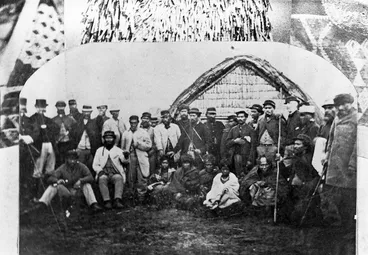

![[Arden, Francis Hamar], 1841-1899 :Bell Blockhouse, Taranaki. 1860. Image: [Arden, Francis Hamar], 1841-1899 :Bell Blockhouse, Taranaki. 1860.](https://images.digitalnz.org/mcM2-cSUD_bMMVfx4MIOy4gPeRU=/368x0/https%3A%2F%2Fndhadeliver.natlib.govt.nz%2FNLNZStreamGate%2Fget%3Fdps_pid%3DIE117223)
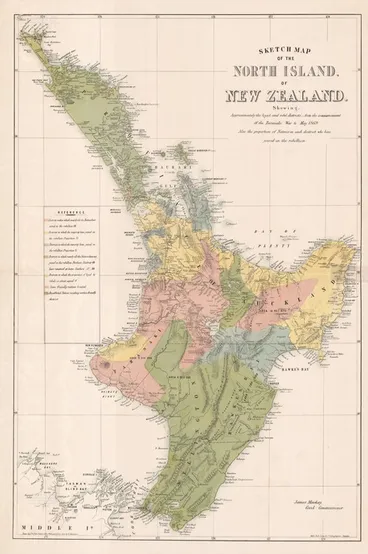
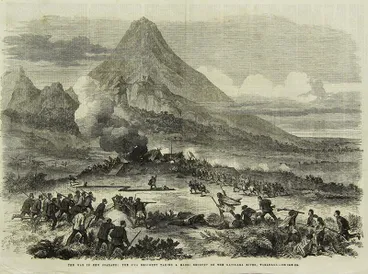


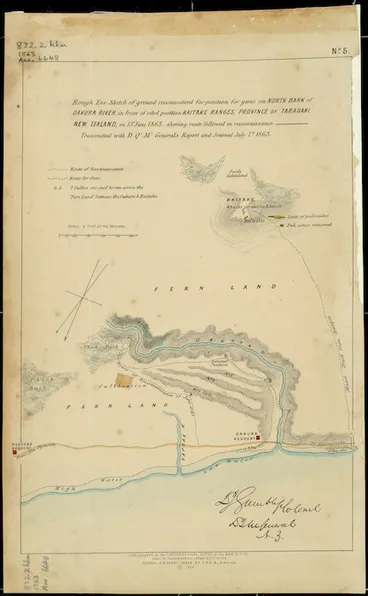
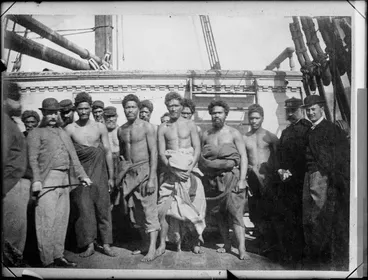
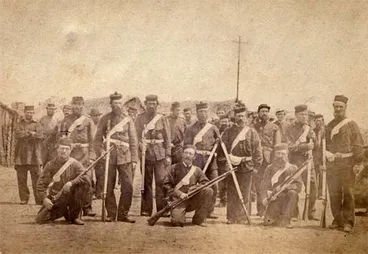
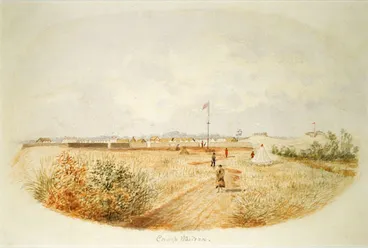
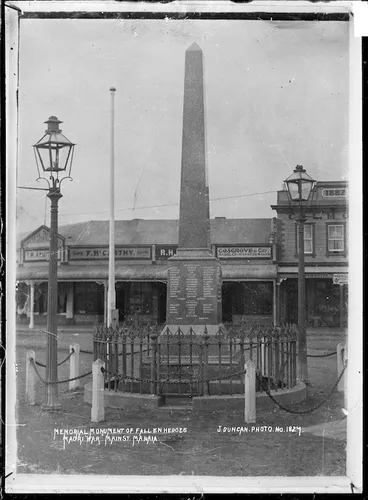

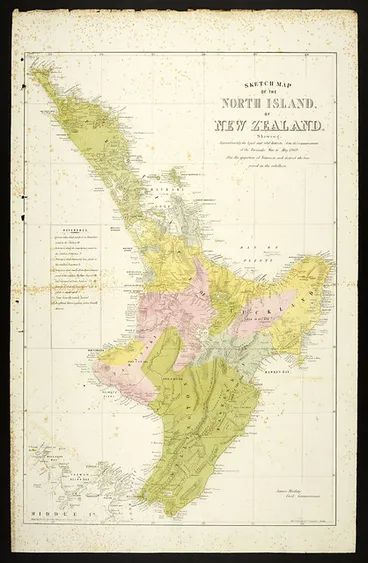
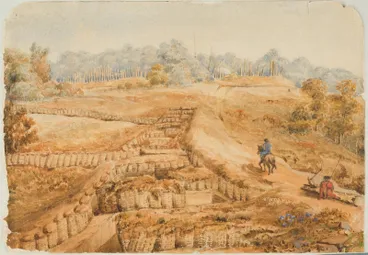
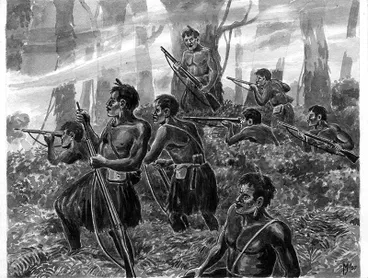
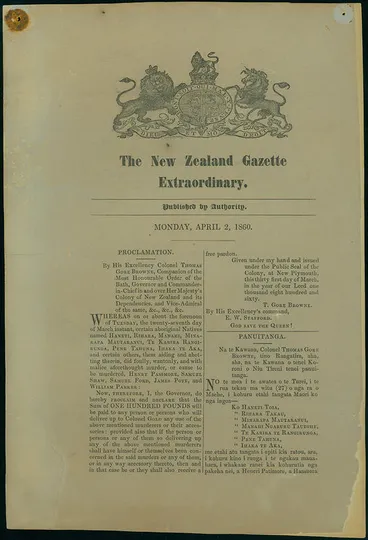
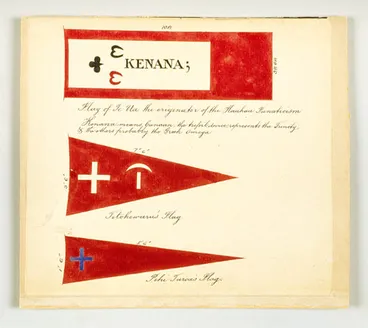
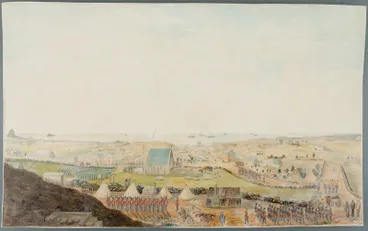
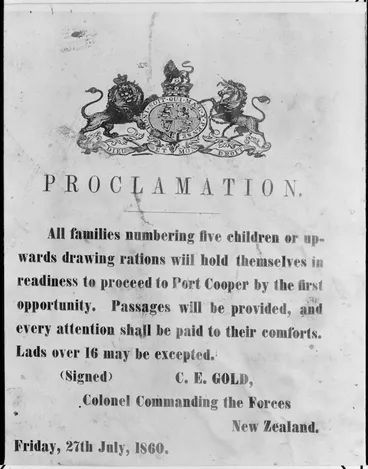
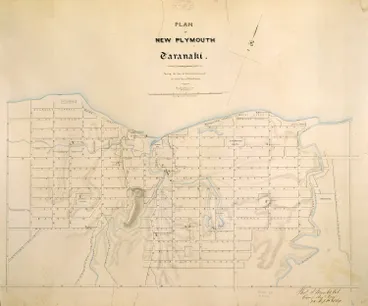
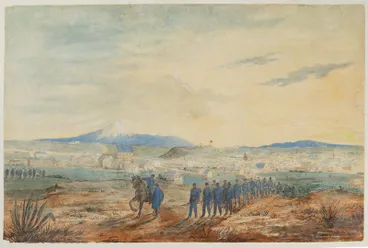
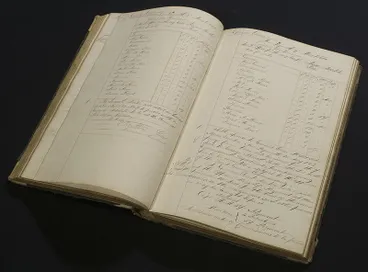
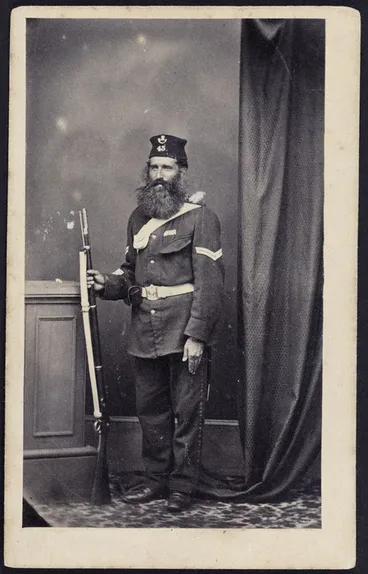
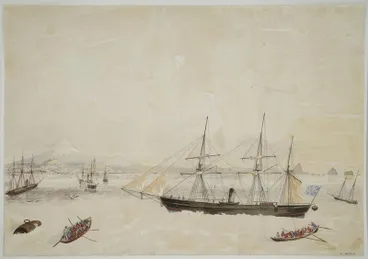
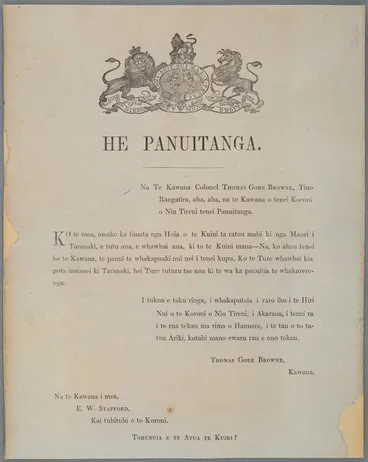
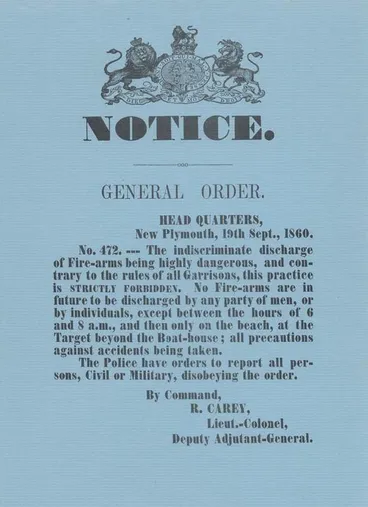

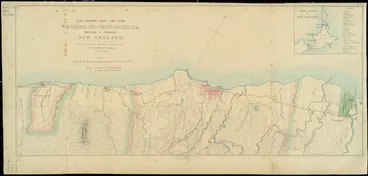
![L Pa Waitara [map] Image: L Pa Waitara [map]](https://images.digitalnz.org/haI0QWIjgx01BWYmPLY5l2xJ0hE=/368x0/https%3A%2F%2Fcollection.pukeariki.com%2Frecords%2Fimages%2Flarge%2F85486%2F3e67cc22a5c9960c552614e72d2a806e9d04a84b.jpg)
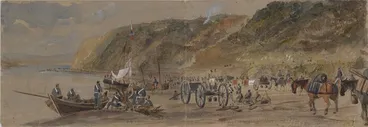
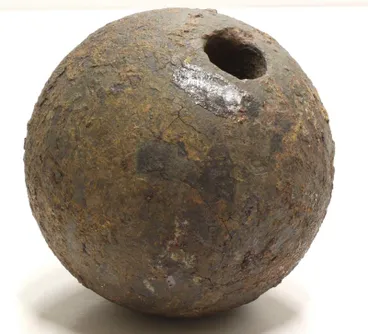
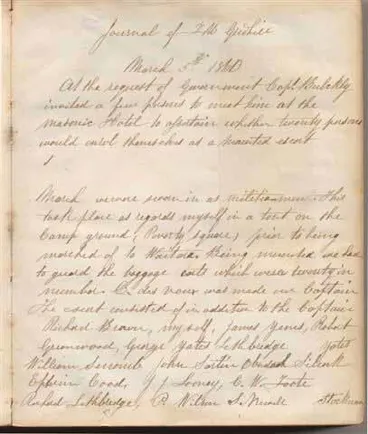
![[Hobson, Henry], fl 1881: Mount Taranaki and three groups of people Image: [Hobson, Henry], fl 1881: Mount Taranaki and three groups of people](https://images.digitalnz.org/OMSyM3CNwAZQz00vX_IRbLoKYZY=/368x0/https%3A%2F%2Fndhadeliver.natlib.govt.nz%2FNLNZStreamGate%2Fget%3Fdps_pid%3DIE1133447)
![Warre, Henry James, 1819-1898 :Te Arei. Oct 17. [1864] Image: Warre, Henry James, 1819-1898 :Te Arei. Oct 17. [1864]](https://images.digitalnz.org/xPVtQB9xDvmpl2xQgp4ij8QLcDU=/368x0/https%3A%2F%2Fndhadeliver.natlib.govt.nz%2FNLNZStreamGate%2Fget%3Fdps_pid%3DIE330883)
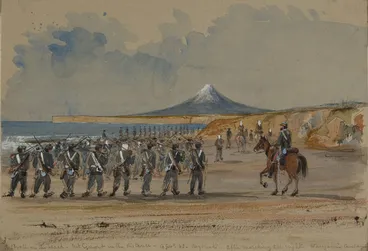
![Artist unknown :Mount Egmont and Turo Turo Mokai Redoubt, New Zealand. [Published in The illustrated Australian news, 19 June 1869] Image: Artist unknown :Mount Egmont and Turo Turo Mokai Redoubt, New Zealand. [Published in The illustrated Australian news, 19 June 1869]](https://images.digitalnz.org/Ulid9xwmH9BUI2I4UwtYZsYFiic=/368x0/https%3A%2F%2Fndhadeliver.natlib.govt.nz%2FNLNZStreamGate%2Fget%3Fdps_pid%3DIE98946)
![[Harris, Edwin] ca 1810-1895 :New Plymouth, New Zealand [1860] Image: [Harris, Edwin] ca 1810-1895 :New Plymouth, New Zealand [1860]](https://images.digitalnz.org/Dh6IIsgbfYNiYJ6d-1jJRvTbK10=/368x0/https%3A%2F%2Fndhadeliver.natlib.govt.nz%2FNLNZStreamGate%2Fget%3Fdps_pid%3DIE63320)
![[Harris, Edwin] ca 1810-1895 :[New Plymouth, 3 August 1860. Troops of the 40th Regiment being ferried ashore by lighters from H. M. S. Victoria, early evening, with H. M. S. Airedale, Paddle steamer Tasmanian Maid, brigantine George Henderson and a schooner] Image: [Harris, Edwin] ca 1810-1895 :[New Plymouth, 3 August 1860. Troops of the 40th Regiment being ferried ashore by lighters from H. M. S. Victoria, early evening, with H. M. S. Airedale, Paddle steamer Tasmanian Maid, brigantine George Henderson and a schooner]](https://images.digitalnz.org/6yEXgkNUhDBSrR33BveK_dEeqiY=/368x0/https%3A%2F%2Fndhadeliver.natlib.govt.nz%2FNLNZStreamGate%2Fget%3Fdps_pid%3DIE70482)
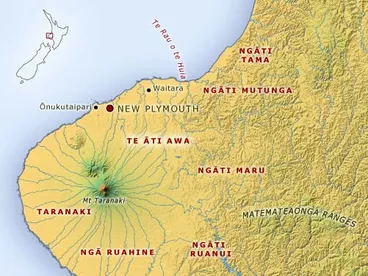
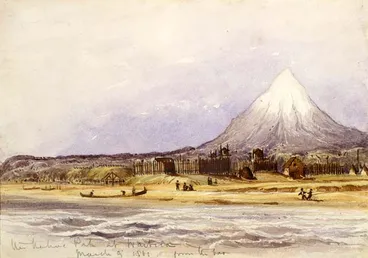
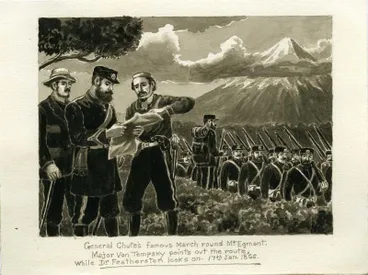
![Artist unknown :[Album of an officer. Enjoying a pipe and a book, South Taranaki or Wanganui? Nov. 15 [18]65 Image: Artist unknown :[Album of an officer. Enjoying a pipe and a book, South Taranaki or Wanganui? Nov. 15 [18]65](https://images.digitalnz.org/73GEEAjv9uIDEGYwYlz08-aua0Y=/368x0/https%3A%2F%2Fndhadeliver.natlib.govt.nz%2FNLNZStreamGate%2Fget%3Fdps_pid%3DIE56239)
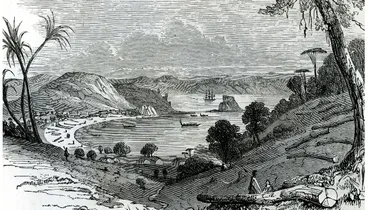
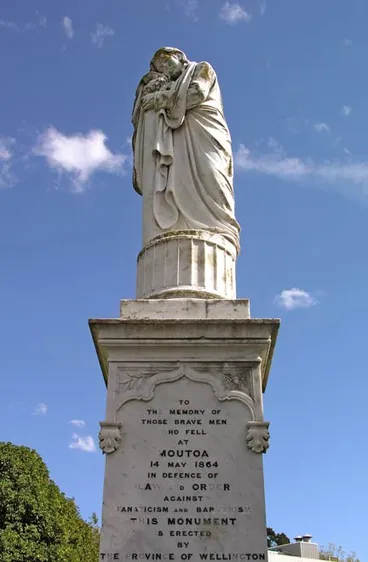
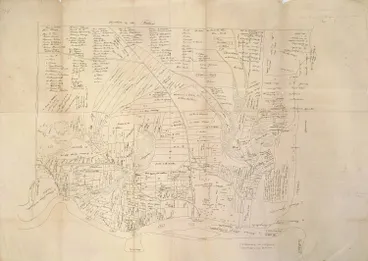
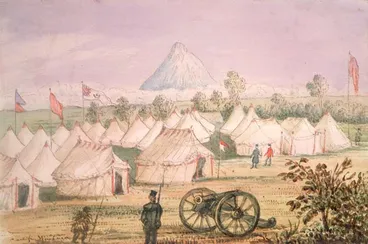
![McCarthy, Justin E D :Camp "Waitira" / J McC -[1860?] Image: McCarthy, Justin E D :Camp "Waitira" / J McC -[1860?]](https://images.digitalnz.org/Oc8UC97vEMWUbGlVBkr-EA7EnGo=/368x0/https%3A%2F%2Fndhadeliver.natlib.govt.nz%2FNLNZStreamGate%2Fget%3Fdps_pid%3DIE214437)
